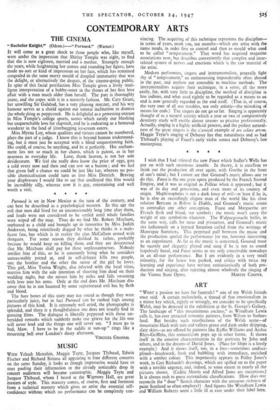MUSIC
WITH Yehudi Menuhin, Maggie Teyte, Jacques Thibaud, Edwin Fischer and Richard Strauss all appearing at four different concerts on the same Sunday, it looks as though impresarios would have to start pooling their information or the already noticeable drop in concert audiences will become catastrophic. Maggie Teyte and Jacques Thibaud, whom I heard at the Wigmore Hall, are great masters of style. This mastery comes, of course, first and foremost from a technical mastery which gives an artist the essential self- confidence without which no performance can be completely con- vincing. The acquiring of this technique represents the discipline— in terms of years, mark you, not months—which any artist with the name needs, in order first to control and then to mould what used to be called "temperament" That word has acquired magazine associations now, but describes conveniently that complex and inter- related system of nerves and emotions which is the raw material of the artist.
Modern performers, singers and instrumentalists, generally fight shy of " temperament," an embarrassing imponderable often abused in the past, and anyhow not amenable to machine methods. The instrumentalists acquire their technique, in a sense, all the more easily, for, with very little to discipline, the method of discipline is less tedious, and what used rightly to be regarded as a means to an end is now generally regarded as the end itself. (That is, of course, the very root of all our troubles, not only artistic—the mistaking of means for ends.) Tne singers do not go so far. Singing is apparently thought of as a natural activity which a year or two of comparatively desultory study will enable almost anyorx to practise professionally. Actually, singing is a highly artificial process, and the perfect natural- ness of the great singers is the classical example of ars celare artem. Maggie Teyte's singing of Debussy has that naturalness and so had Thibaud's playing of Faure's early violin sonata and Debussy's late masterpiece.
I wish that I had enjoyed the new Faust which Sadler's Wells has put on with such enormous trouble. In theory, it is excellent to think out the production all over again, with Goethe in the front of one's mind ; but I cannot see that Gounod's music allows one to do this. Faust is the one great opera produced by the French Second Empire, and it was as original as Pelleas when it appeared ; but it was of its day and generation, and even more of its country of origin. Mephistopheles is not a dark force of evil—at least if he is, he is also an exceedingly elegant man of the world like his close relation Bertram in Robert le Diable, and Gounod's music seems to contradict any other conception. Faust and Marguerite are French flesh and blood, not symbols: the music won't carry the weight of any symbolism whatever. The Walpurgisnacht ballet, in the same way, calls for tutus and pirouettes, and Gounod's music sits ludicrously on a learned Satanism culled from the writings of Montague Summers. This perpetual pull between the music and the production spoiled the performance for me, however interesting as an experiment. As far as the music is concerned, Gounod must be suavely and elegantly played and sung if he is not to sound hopelessly banal, and Faust seems to me only conceivable nowadays in an all-star performance. But I am evidently in a very small minority, for the house was packed, and critics with twice my learning and experience have written enthusiastically of both pro- duction and singing, after rejecting almost wholesale the singing of
































 Previous page
Previous page